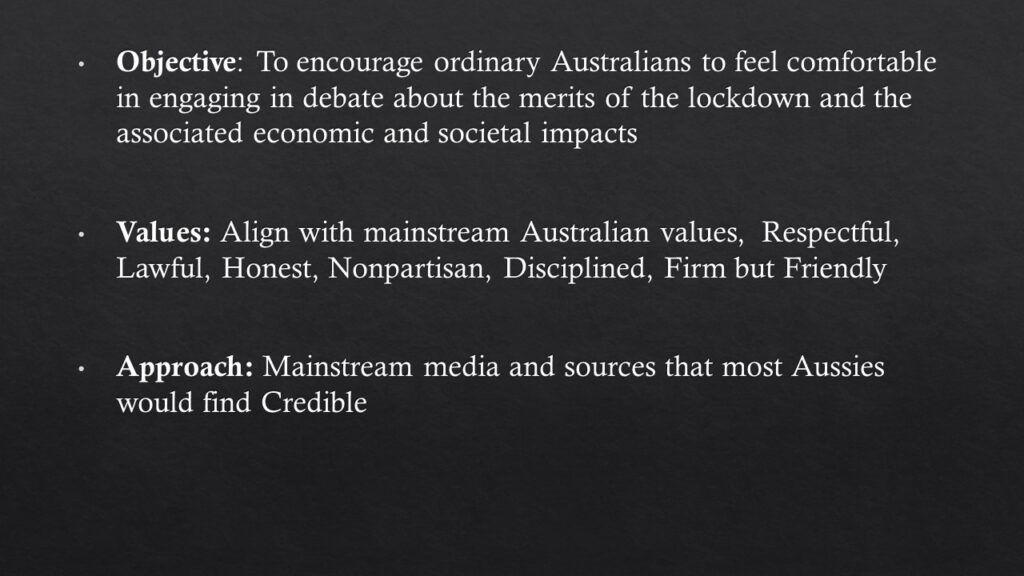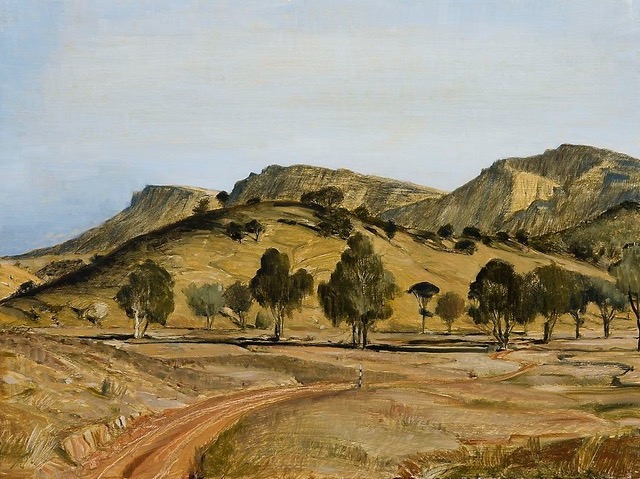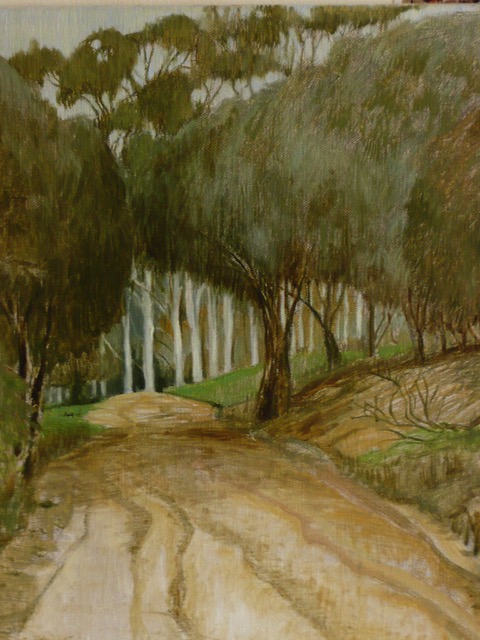By Tim Flynn, Illustrated by Michael Fitzjames
The End the Lockdown Australia group on Facebook was formed in early April, mainly because of the fundamental belief of the founder Tim Flynn that “he had to do something”. In a time of lockdown this appeared the sole viable means of creating a grass roots movement.
Flynn, who has 30 years of experience in senior government financial roles, adapted the same methods that he would if “say, the council were planning to sell the local cricket pitch to property developers to build a set of units” to the online world.

The “Village Green Preservation Society” approach has proved broadly effective, in that an engaged online community of “Middle Australia” has been created, but there are a number of peculiarities that emerged that he wishes he had addressed earlier.
Tim concludes with an appeal to the Prime Minister and State Premiers to engage and collaborate with local community leaders to identify workable solutions rather than adopting the authoritarian approach which has characterised Government response up to this point.
He writes: Over the past few months, I have often wondered, what on earth led me to set up a Facebook Group dedicated to ending the lockdown. The original objective was “to encourage ordinary Australians to feel comfortable in engaging in debate about the merits of lockdown and the associated economic and societal impacts”; over time, the group has evolved into providing members with:
⦁ re-assurance in the face of incessant propaganda that they weren’t turning into conspiracy nuts or developing psychopathic granny-killing traits and
⦁ a means to focus lobbying effectively.

I was reluctant, to say the least, to take on the mantle of an internet Michael Collins, as pre-lockdown, I regarded Facebook as a way to:
⦁ keep up and share jokes with mates around the world, as I’ve moved around a lot over the years; and
⦁ market the historical novels I write as a hobby.
Further, I suspected uncharitably, that people who spent too long on Facebook, were rather lonely souls who probably needed to get out a bit more, take up a hobby and make a few friends.
However, developments in the month of March 2020 challenged this perception and convinced me that setting up a Facebook group was the only reasonable path to take, given the effective silencing of reasonable reservations about lockdown policy.
From Accountant to Keyboard Warrior

I’m a fairly staid accountant and specialise mainly in government finance and most of the past ten years has been spent as a “steady pair of hands” interim CFO for Councils, NFP’s and Government Departments; interspersed with periods as a consultant, using my internal audit background to deal with policy evaluations that wiser people had consigned to the “too hard basket”.
Why did my mates suddenly become crap statisticians?
I spent countless hours of my youth dozing through statistics lectures and it is a subject that, even though I use it a lot in my work, has never captured my enthusiasm.
However, in early March, I noticed that many of my friends became overnight “experts” and began discussing avidly logarithmic and exponential growth.
This was initially amusing because some of the most vociferous have confessed over the years, to being totally “number blind” and often send copies of statistical reports and annual financial statements and ask me, as a favour, to provide a couple of intelligent questions to raise at AGM’s and board meetings, to avoid looking silly.
A polite challenge to these pronouncements frequently confirmed that the speaker didn’t have a clue what the terms actually meant, and further challenge resulted in inordinately truculent responses.
What do you know you’re not a doctor

I noticed a sudden deference and reverence for “the medical profession”. General Practitioners, Registered Nurses and allied health professionals began expressing opinions about a policy response that they were poorly qualified to make.
Policy development, implementation and evaluation is an elite profession in its own right (or at least it was, until they started putting senior civil servants on short term contracts) and it’s rather unfair to ask a GP to comment on such matters, and unwise to pay much attention to what they say when they do, as they are not trained in QALYs (Quality Adjusted Life-Years), the Treasury Green Book or perverse policy outcomes at Med’ School, as far as I’m aware.
A compounding factor was that, whilst medicos are great in their respective fields, my experience ( I’ve worked in lot of health organisations) is that in allocating health resources there are strong incentives for doctors to exaggerate the severity of a health problem in order to secure more funding for their specialty.
Why is the telly news sounding like a bad American war movie?

In early March, I was sceptical that anyone in power would take the calls for lockdown seriously, because the last time that an economy stopped was the fall of the Roman Empire and five centuries in the dark ages didn’t sound like an attractive option to anybody.
However, as I watched ABC News, I began to wonder how anybody was taking the mounting hysteria seriously.
One of my favourite books is a collection of front pages of the UK Daily Mail from the Second World War. I noted that the language used to describe the Battle of Britain, the London Blitz and D Day, much more restrained than the hyperboles “front line” “battle” “war” on television.
Why don’t the numbers add up?

Late March and the announcement of lockdown, and the closure of the pubs (I’m divorced with an eleven-year-old son who lives interstate) left me with a lot of time on my hands in the evenings.
I have frequently been tasked in my career to appraise complex policy models. This is crucial because often proposals that sound great on paper fall apart when translated into numbers.
A key consideration when undertaking this kind of work, is that there’s a strong incentive for enthusiastic proponents of a solution to develop overly complex convoluted models to disguise the fact that a proposal that sounds good in theory, won’t work in practice.
My standard approach is to develop a crude model independently and then compare it to the model presented and see where the differences lie and assess their reasonableness.

I find that this is a good approach as otherwise, it’s too easy to get lost in the detail and not see the wood from the trees. I duly constructed a model, based upon the available statistics from China and Italy, and the published variables from Imperial College and translated them to an Australian and British context and could find no justification for the threatened 140,000 and 500,000 predicted deaths in these respective countries.
It would have been good to have the actual models and examine their underlying assumptions, but this information is yet to be released.
I also became increasingly concerned at the lack of modelling provided by government on the economic and social costs of the lockdown and began to wonder why normal practices appeared to have been abandoned.
Nonetheless, I concluded that the majority probably knew best and decided to devote my evenings to setting up a virtual Irish pub and persuading musician friends to perform virtual concerts to keep up the spirits of the ex-pat community, many of whom, like me, live alone.
Why are you endangering my granny’s life?

Towards late March a number of articles were published in “serious” newspapers like the Australian and the Financial Times quoting the reservations of eminent judges, scientists and economists about the wisdom of lockdown.
These articles matched my own reservations and I shared these articles on my Facebook page hoping to provoke an interesting discussion from friends who I regarded as fair minded, intelligent liberals.
However, I was met with derision, scorn, and accusations of having psychopathic intentions towards the elderly and the vulnerable.
I, therefore, became convinced that I had to do something, but what?
What am I going to do about it?

Facebook has become, in a time of lockdown, the only game in town if you want to start a social movement.
I had a look at the various anti-lockdown groups on Facebook but they seemed to be dominated by:
⦁ Snake oil salesmen, ($15,000 for a bedside lamp that “cured” COVID),
⦁ Sovereign Citizens (Buy my book and it’ll give you a magical set of words that will terrify the police and the courts and you don’t need to abide by the rules) ; and
⦁ The plain demented (It’s all a plot for [insert villain] to take over the world)
People might suggest that I should have attempted to be a “voice of reason” but past experience had taught me the insidious nature of these groups and the futility of trying to argue with their disciples.
Past Experience of Sovereign Citizens

One of the reasons that I was so staunchly opposed to the conspiracy theorists, was that I was once forced to report a particularly nasty Sovereign Citizen scam to the Australian Charity Commission. A few years ago a close friend’s adult son had developed a cult like adherence to a sovereign group and had parted with $1,000 to attend a “freedom workshop”; and had he adopted the advice given then his sick father’s house would have been at risk of repossession.
Adopting a “Village Green Preservation Society” approach

In early April, I began to consider the following:
There were plenty of articles in reputable newspapers questioning the value of lockdown but these were not being reported on television news.
I come from a middle class, “pillar of the community” type background, but the normal means of raising a grass root movement namely, persuading local worthies to attend a meeting, set up an association with sound governance, letters to politicians, door to door petitions was clearly untenable or unlawful.
I spoke to a good friend who’s a Commonwealth Opposition MP and he expressed his frustration that parliament had effectively been suspended.
I therefore decided that the only reasonable option was to set up my own group to engage middle Australia, as I could find no suitable established groups.
It has become the equivalent of the Roman public forum, as traditional means of raising support and lobbying for a point of view are either unlawful or untenable.

However:
⦁ There are no textbooks to guide you to set up and grow a virtual social movement in an ethical and responsible manner.
⦁ If you set up an issues-based movement, normally the first step is to persuade the local “great and the good” to turn up at meetings. This is important because not only do they lend an air of respectability, but these people know how to get things done, together with the nuances of setting up associations with charters, articles of incorporation and the fundamentals of governance that means that everybody has their say .
I therefore decided to adapt the “pillar of the community” approach to Facebook as closely as possible and in Late April organised a virtual meeting with the handful of original members to map out a set of rules and objectives.
How Running a Facebook Group Differs from Running a “Village Green Preservation Society”

Managing the group has required a number of adaptations to function and the most ironic is that I have had to act in an arbitrary manner in a group founded on mainstream democratic values and have had to silence many voices.
In my attempt to preserve the “tone” of the site as a credible voice and with 3,000 posts and responses per day, it’s been hard to stop the group from being overrun by insanity without heavy use of the “ban button”.
I am keenly aware that there are many good people who have been banned that probably shouldn’t have been and who regarded the group as a haven of sanity in a crazy environment.
To those people, I can only apologise and offer the following explanation.
When I established the group in early April, my objective was to run it in a pluralistic manner, establish a steering committee and get consensus on editorial policy. The first meeting was held on the 23rd April and was well attended, and we agreed on a strategy to share mainstream media articles challenging the lockdown and adopted a “motherhood and apple pie” set of values.
However, it has been difficult to keep that momentum up as subsequent meetings have been sparsely attended. I think that the main reason for this is that I’m a firm believer that the secret to good attendance at a local political group is a tight agenda, which leads to a swift meeting and a quick departure to the local pub, where members can enjoy a pleasant social occasion in good company, which encourages repeat attendance. Clearly Zoom did not facilitate such an approach, and I also think that by late May, people had been Zoomed out by work meetings and could not face the prospect of another one in the evening.
This meant that editorial responsibility has been passed to myself and a small team of moderators, however, it’s difficult to recruit and retain effective moderators as it’s a thankless, unpaid task that can become very time consuming. This difficulty is compounded by the way that many people regard Facebook.
Responsibility Vortex

Many people see Facebook as a kind of responsibility vortex and a surreal world where they can say what they like without fear of consequence. However, the recent arrests for “incitement” in Victoria show clearly that this is not the case.
In my view, authorities should have accompanied their warnings with a public education campaign on people’s responsibility on Facebook. Posts in my group, ( many of which I deleted) showed that many people did not understand the concept of incitement, and I was very keen to ensure that my members did not get charged with an offence that carries a maximum fifteen years sentence, without understanding the consequences of their actions beforehand. I therefore felt a duty to act as some kind of house prefect and strongly recommend that people not participate, despite my core values that the right to protest is fundamental to a democratic society
Facebook Fact Checking is Counter-Productive

I have been keen to maintain the credibility of the articles shared in the group but threats from Facebook to silence the group have been counter-productive because some articles that have been flagged have come from the UK Daily Mail and Australian Government websites. It’s patently unreasonable to expect Tim Flynn operating from his laptop to have a better fact checking capacity than the Australian Government or a major Fleet Street Newspaper.
A lot of us weren’t that interested in politics up to now
If anybody ever asks me what did you do in the great COVID crisis daddy? My response will be that prior to the Victorian Upper House debates on extending the state of emergency I spent several hours explaining, in a couple of hundred words in bullet points, how the Victorian Parliament worked and the need to focus lobbying on the upper house cross bench members who were undecided.
The post was shared many I times and I received a number of private messages thanking me for explaining the situation succinctly as many members had not been interested in politics before but felt deep in their gut that they felt compelled to become active now, but were not sure how to do so effectively.
There are a number of respected writers and elected members in the page and I hope that they will understand that there are now many people who are heavily invested in the political process out of sheer gut feeling, but lack an understanding of the finer nuances of parliamentary processes, that they take as assumed knowledge and will adapt their approach accordingly.
It’s hard to sort the wheat from the chaff online
Given my experience of Sovereign Citizens and other Conspiracy nuts, I find preying on the poorly educated, frightened and desperate, a despicable thing to do and possess a firm determination not to help these creatures spread their poison and, recognising the futility of reasoning with their cult like disciples, have a policy of showing anybody spreading this garbage the door.
I have set up a list of key word warnings that flag members using phrases that these characters churn out and my standard response is the ban button.
There are currently 3,700 members, few of whom I have met in person, and it’s easy to make mistakes. For example, I received a private message from an eminent scientist, clearly an expert in her field, who was under a misapprehension about the concept of “common law”.
The sovereign citizens have created an alternative history where the English Civil War never happened and we have all been elevated to the peerage and have obtained the rights of Medieval Feudal Barons. The use of the term on a couple of occasions “red flagged” her and she was banned from the group. However, I was distraught to learn that she had come to regard the group as something of a haven of sanity in a time of trying personal circumstances.
I have tried to engage with members, to try to avoid this recurring , and have set up polls to allow them to show their academic, trade and professional credentials and it came as no surprise that the overwhelming response was a lot of degree qualified, business owners, managers, professional and qualified trades people. In short, the people who make a functioning society work.
That’s what we do

I was tempted to quote Chuck Palahniuk as a concluding warning to the Prime Minister and Premiers:
“The people you’re trying to step on, we’re everyone you depend on. We’re the people who do your laundry and cook your food and serve your dinner. We make your bed. We guard you while you’re asleep. We drive the ambulances. We direct your call. We are cooks and taxi drivers and we know everything about you. We process your insurance claims and credit card charges. We control every part of your life.”
However, I think the real message from the End the Lockdown group should be:
⦁ Rather than decry us as bat shit crazy conspiracy nuts, recognise that there are a lot of expert and rational voices opposing lockdown.
⦁ By employing repressive police tactics to stifle dissent, you’re strengthening resolve against you.
⦁ Democracy, freedom, mateship, decency, egalitarianism, courage are not empty political slogans, these are the values that make us, us; don’t underestimate this.
⦁ We’re the professionals, trades and business people that you rely upon to provide critical thinking to solve problems and lead our communities.
⦁ We’re not used to being treated as recalcitrant and petulant children and it’s a grave waste of resources to treat us as such.
⦁ We hold positions of trust in the community and by denying the fact that there are now compelling arguments to End Lockdown, you are creating a vacuum of leadership, that less responsible elements will fill.
⦁ We care for our communities and are keen to find a way to care for our vulnerable in ways that also don’t destroy our economies and put an unconscionable burden on the poorest members of society.
Therefore, engage with us and work with us to find sensible and practical local solutions; that’s our expertise, that’s what we do.
Tim Flynn’s career spans thirty years as a finance professional in Government, Medical Research and Health, International Development and Infrastructure. He has held numerous CFO and Chief Internal auditor appointments and has worked all over Australia and in Afghanistan, Mozambique, the Solomon Islands and Indonesia.
Michael Fitzjames worked as an illustrator for The Guardian newspaper in London from 1978 to 1980, The Sydney Morning Herald from 1990 to 2000, and the Australian Financial Review from 2000 to 2012. His work is held in many significant institutions including the State Library of New South Wales, State Library of Victoria and the Australian War Memorial.


2 Pingbacks